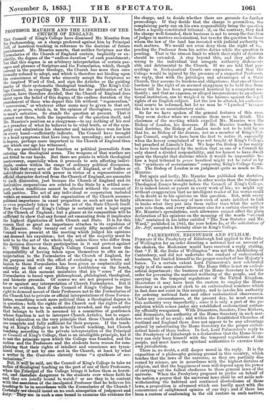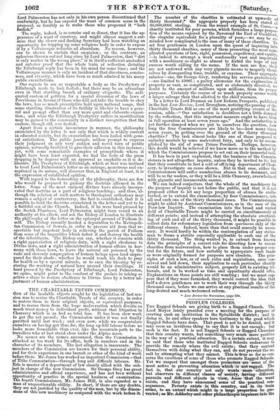PALMERSTON, EDINBURGH AND FULHAM.
PERHAPS if the Presbytery of Edinburgh had applied to the Duke of Wellington for an order directing a national fast on account of the cholera, the Moderator would have received a reply stating, that "F. M. the Duke of Wellington" was not the Archbishop of Canterbury, and did not undertake the conduct of ecclesiastical business, but limited himself to the proper conduct of her Majesty's forces. To a certain extent Lord Palmerston's now celebrated reply is of the same character. The Home Office is not an ecclesi- astical department; the business of the Home Secretary is to take order for governing the material wellbeing of the people, and for carrying on the temporal regulations of the United Kingdom. Heretofore it may have been the custom to employ the Home Secretary as a species of clerk to an ecclesiastical conclave which in fact does not exist in this country, and to invoke his authority for ordering national fasts and other ecclesiastical observances. Under any circumstances, at the present day, he must exercise this authority very imperfectly ; since it is only a part of the po- pulation which comes under any established ecclesiastical author- ity officially recognized. With Dissenters, Seceders, Free-Kirkers, and Romaniats, the authority of the Home Secretary in such mat- ters could be of no avail ; and within the Established Churches of Scotland and England there does not appear to be any advantage gained by substituting the Home Secretary for the proper ecclesi- astical heads of those bodies. In fact, Lord Palmerston 's reply to the Presbytery of Edinburgh is a declaration that the Home Secre- tary can only busy himself with the temporal regulations of the people, and must leave the spiritual authorities to exercise their own jurisdiction. There is, no doubt, a still deeper moral in the reply. It is the exposition of a philosophy gaining ground in this country, which teaches that the laws of the universe, as they are partially dis. cerned by science, are in accordance with the highest dictates of religion, and that the happiness of man will depend upon his power of carrying out the fullest obedience to those general laws of the universe. When the Presbytery proposed to prefer on behalf of the nation a prayer that the universal laws shall be set aside not- withstanding the habitual and continued disobedience of thew laws, a proposition, is advanced which can hardly meet with the concurrence of enlightened opinion of our day ; and if there has been a custom of =forming to the old routine in such matters,
Lord Palmerston has not only in his own person discontinued that conformity, but he has exposed the want of common sense in the proposal, so forcibly as to make those who propound it "look foolish."
The reply, indeed, is so concise and so direct, that it has the ap- pearance of a want of courtesy, and might almost suggest a sur- mise that the clever and dashing Secretary had been watching an opportunity for tripping up some religions body in order to expose it by a Voltairesque reductio ad absurdum. No reason, however, can be shown to sustain that suspicion ; on the contrary, an aphorism thrown out not long since by Lord Palmerston, that "dirt is only matter in the wrong place," is in itself a sufficient unstudied and anterior proof that the whole train of reflection dictating the Edinburgh reply has been in his mind for some time; and the Voltairesque manner is only an incident of that directness, concise- ness, and vivacity, which have been so much admired in his many public exercitations. One regrets to see so respectable a body as the Presbytery of Edinburgh made to look foolish ; but there may be an advantage even in that startling breach of ordinary' etiquette. The anti- quated custom of petition for a special diversion of the laws of Providence in favour of those who will not take the trouble to obey the laws, has so much prescriptive hold upon national usage, that some startling illustration of its futility is likelier to have a gene- ral and prompt effect than any more quiet and elaborate exposi- tion; and what the Edinburgh Presbytery suffers in mortification May be gained to the community in a distinct recognition that the custom, though old, was foolish.
Apart from a certain insouciance in manner, the philosophy enunciated by the letter is not only that which is widely current in educated society, but its enunciation has been hailed with gene- ral satisfaction. The public journals, seldom prompt to express their judgment on any very sudden and novel turn of public opinion, naturally hesitated to give their adhesion in this instance ; yet, with some remarkable examples of promptitude where it might have been least expected, we find the body of the press dropping in by degrees with an approval as emphatic as it is de- liberate. The Presbytery of Edinburgh, which at first was inclined to treat Lord Palmerston's letter as an outrage, monstrous and ex- ceptional in its nature, will discover that, in England at least, it is the expression of established opinion.
With regard to the heterodoxy of the philosophy, there are few who would be prepared to gainsay the doctrine affirmed in the letter. Some of the most eminent divines have already incorpo- rated that doctrine as a part of religious teaching; and thus, al- though the relation of such matters to theological orthodoxy may remain a subject of controversy, the fact is established, that it is possible to bold the doctrine enunciated in the letter and yet to be a faithful son of the Church. Indeed, if he were hard pressed by the Scotch Pharisees, Lord Palmerston might turn round to an authority at his elbow, and ask the Bishop of London to illustrate the philosophy of the letter on the episcopal ground of Fulham it- self. The Bishop recently headed a deputation to the Metropoli- tan Commission of Sewers, in order to procure aid from that re- spectable but impotent body in relieving the parish of Fulham from some of the impurities which infect it and destroy the health of the inhabitants. The Bishop can say, whether it consists with a right appreciation of religious duty, with a right obedience to Divine laws, and a right administration of human affairs in har- mony with those laws, to leave the natural air poisoned by the rude and slovenly congregation of human beings upon land unpre- pared for their abode ; whether he would teach his flock to pray for health as by a special miracle, or to earn the blessing by re- storing the working of natural laws around their dwellings. If hard Rressed by the Presbytery of Edinburgh, Lord Palmerston, we opine, might point to the conduct of the prelate in taking so active a share to restore obedience to Divine laws by a better ad- justment of human administration.



























 Previous page
Previous page